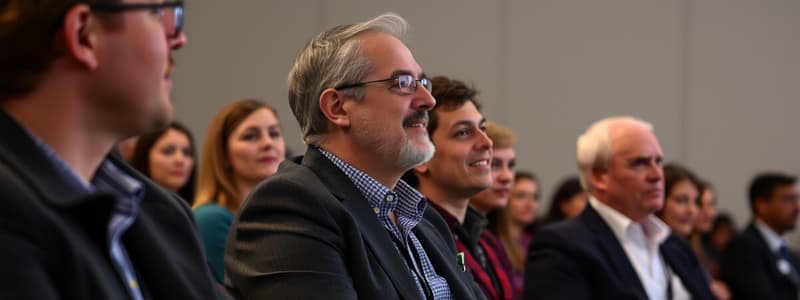Podcast
Questions and Answers
Which of the following describes conciseness in communication?
Which of the following describes conciseness in communication?
- Avoiding direct statements to sound considerate.
- Eliminating unnecessary words to communicate directly. (correct)
- Using complex language to impress the audience.
- Including as many details as possible to ensure clarity.
What does consideration in communication emphasize?
What does consideration in communication emphasize?
- Taking the audience's interests and viewpoints into account. (correct)
- Using technical jargon to enhance credibility.
- Ignoring cultural differences in discussions.
- Prioritizing one's own opinions over others'.
How can clarity be achieved in communication?
How can clarity be achieved in communication?
- By expressing points clearly and avoiding ambiguity. (correct)
- By speaking quickly to maintain attention.
- By using ambiguous terms to spark interest.
- By employing technical terms to demonstrate expertise.
Which example best illustrates correctness in communication?
Which example best illustrates correctness in communication?
Which practice is recommended to enhance effective communication?
Which practice is recommended to enhance effective communication?
Flashcards are hidden until you start studying
Study Notes
Effective Communication
- Success in personal and professional arenas hinges on effective communication, which encompasses various skills.
Key Skills of Effective Communication
-
Conciseness: Communicate points clearly and directly by eliminating unnecessary words.
- Example: From “In my opinion, I think we should…” to “We should…”
-
Consideration: Take into account the audience's interests, needs, and perspectives.
- Example: Respect the traditions and beliefs of coworkers from diverse backgrounds.
-
Clarity: Express thoughts in an understandable manner to avoid ambiguity.
- Use simple language, select words carefully, and incorporate examples for better understanding.
-
Concreteness: Support arguments with specific and relevant examples.
- Example: Specify data, such as “Sales decreased by 15% last quarter” instead of “The sales were down.”
-
Courtesy: Engage in communication that is polite, thoughtful, and respectful.
- Example: Utilize courteous phrases like "please" and "thank you."
-
Correctness: Ensure communication is factual, grammatically correct, and free of errors.
- Example: Properly proofread content to prevent mistakes.
Tips for Effective Communication Skills
-
Practice: Apply these communication elements in interactions with family, friends, classmates, and instructors.
-
Use Visual Aids: Enhance communication with presentation slides, diagrams, videos/images, and animations.
-
Engage with Audience: Foster interaction by asking questions and welcoming feedback.
Studying That Suits You
Use AI to generate personalized quizzes and flashcards to suit your learning preferences.




